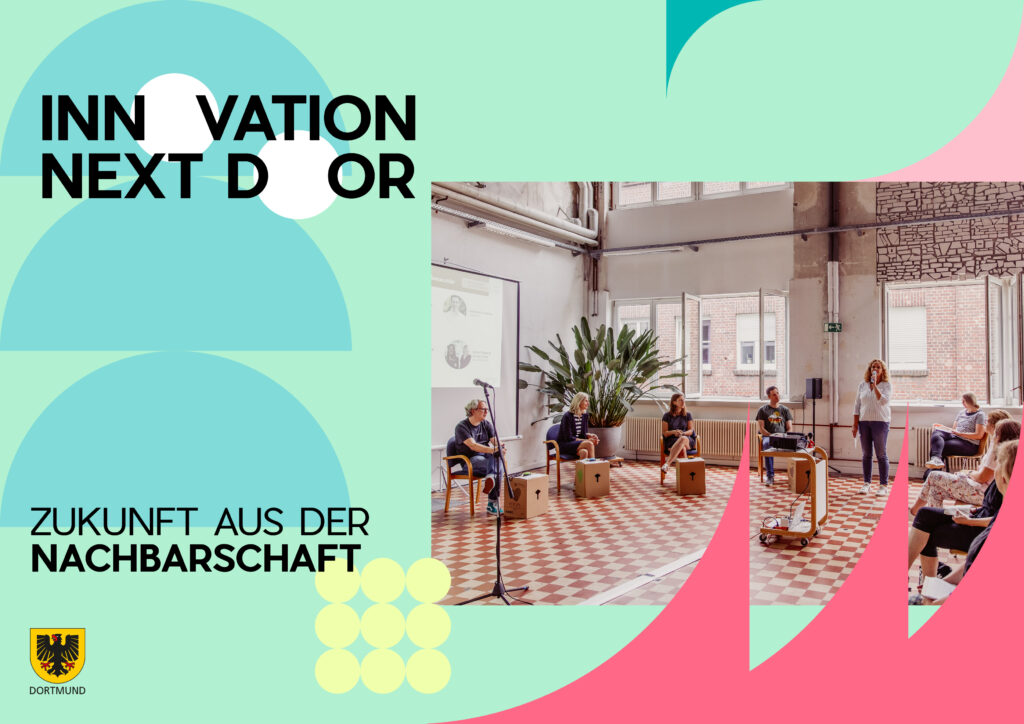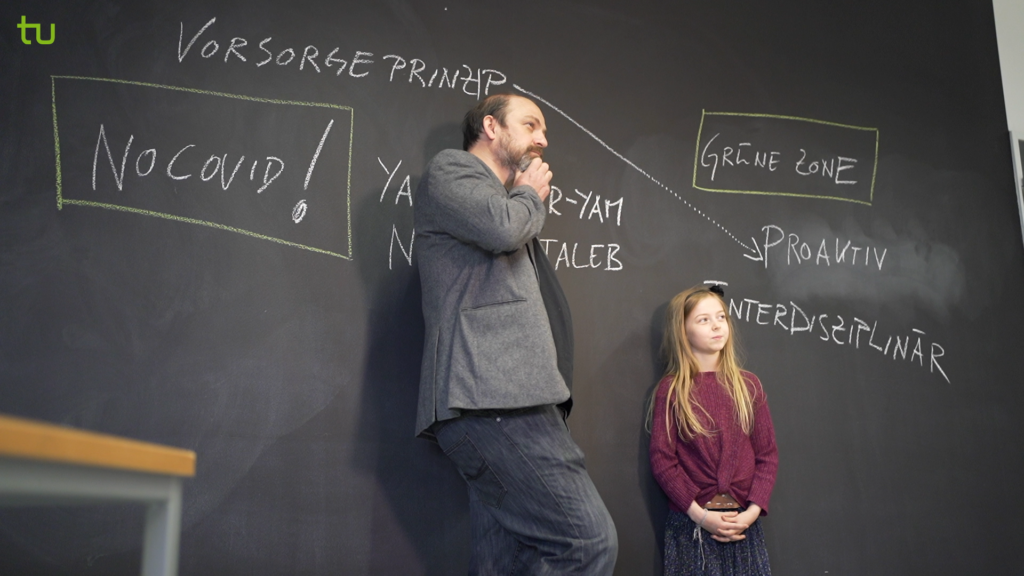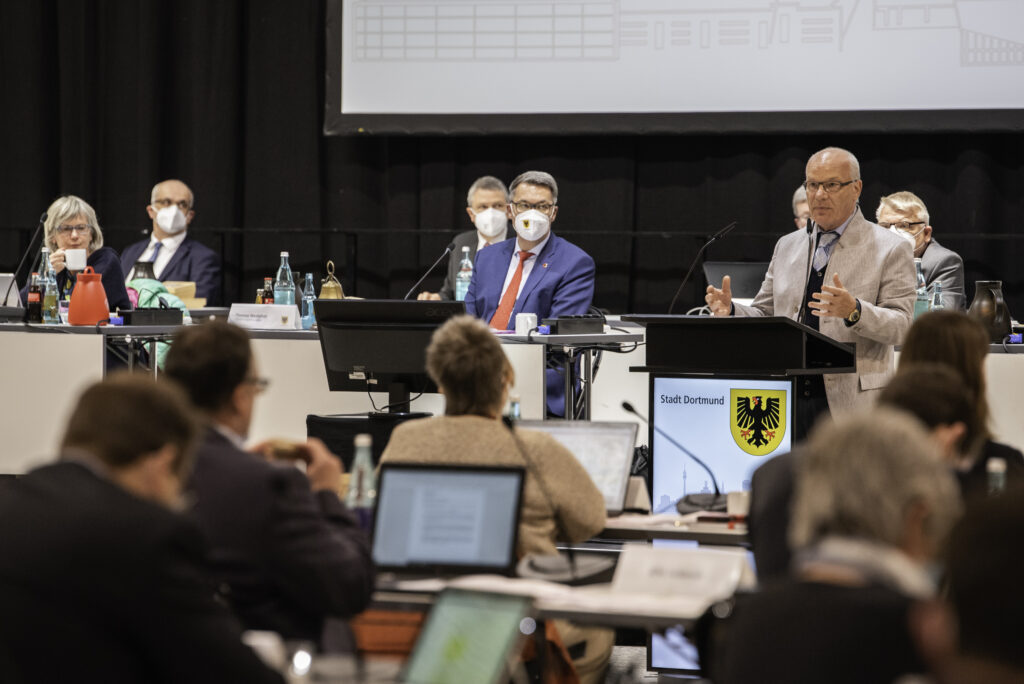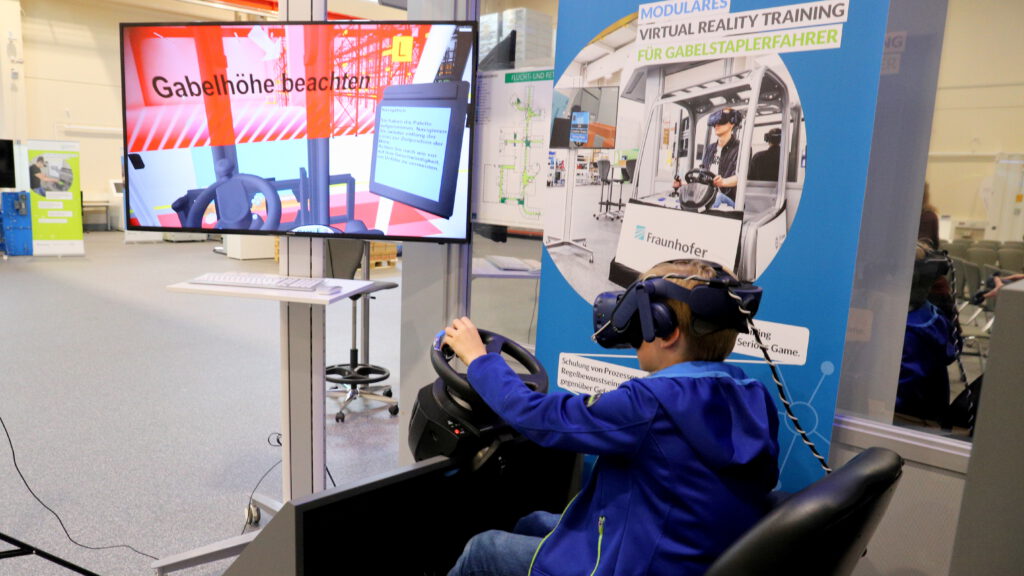Science Master Plan
One city. Lots of knowledge. This is illustrated by the approximately 54,000 students at the seven universities and the large number of non-university institutes, scientific archives as well as museums that make Dortmund an important university and science location.
universities
non-university research institutes
students
cultural institutions
MASTERPLAN
WISSENSCHAFT
Universities
außeruniversitäre Forschungsinstitute
Studierende
Kultureinrichtungen
What´s new?
Dortmund bewirbt sich als europäische Innovationshauptstadt

Mit dem Titel „Innovation Next Door – Zukunft aus der Nachbarschaft“ bewirbt sich die Stadt Dortmund in diesem Jahr für den iCapital Award. Unter dem Motto stellt Dortmund soziale, nachhaltige und technologieorientierte Innovationen sowie die Netzwerke dahinter vor. Foto: Kristina Malis
UA Ruhr besiegelt Zusammenarbeit für internationale Spitzenforschung
 Der Ausbau der internationalen Spitzenforschung der Universitätsallianz Ruhr (UA Ruhr) kann starten: Die drei Rektoren der Ruhr-Universität Bochum, der TU Dortmund und der Universität Duisburg-Essen unterzeichneten im Beisein von Wissenschaftsministerin Isabel Pfeiffer-Poensgen einen Kooperationsvertrag zur Gründung der Research Alliance Ruhr. Damit können die vier Research Center und das College nun beginnen, internationale Spitzenwissenschaftlerinnen und -wissenschaftler für ihre zukunftsweisenden Forschungsvorhaben zu gewinnen. Für die Aufbauphase stellt die Landesregierung hierfür bis 2024 aus Mitteln der Ruhr-Konferenz bis zu 75 Millionen Euro zur Verfügung. Bild: Michael Schwettmann
Der Ausbau der internationalen Spitzenforschung der Universitätsallianz Ruhr (UA Ruhr) kann starten: Die drei Rektoren der Ruhr-Universität Bochum, der TU Dortmund und der Universität Duisburg-Essen unterzeichneten im Beisein von Wissenschaftsministerin Isabel Pfeiffer-Poensgen einen Kooperationsvertrag zur Gründung der Research Alliance Ruhr. Damit können die vier Research Center und das College nun beginnen, internationale Spitzenwissenschaftlerinnen und -wissenschaftler für ihre zukunftsweisenden Forschungsvorhaben zu gewinnen. Für die Aufbauphase stellt die Landesregierung hierfür bis 2024 aus Mitteln der Ruhr-Konferenz bis zu 75 Millionen Euro zur Verfügung. Bild: Michael Schwettmann
KinderUni der TU beantwortet Fragen rund um die Corona-Pandemie

Was ist eine Pandemie und wie können Orte wie der Campus der TU Dortmund zur sicheren „Grünen Zone“ werden? Diesen Fragen geht die aktuelle Vorlesung der KinderUni der TU Dortmund auf den Grund. Das 15-minütige Video zum Thema „Grüne Zonen gegen Corona“ richtet sich an Kinder im Alter von acht bis zwölf Jahren und kann ab sofort online abgerufen werden.
Die Kinder-Uni ist verknüpft mit der Themengruppe 1 „Wissenschaftsstadt“ im Masterplan Wissenschaft 2.0.
Bildhinweis: Prof. Matthias Schneider beantwortet Franziskas Fragen rund um die Corona-Pandemie und die No-Covid-Strategie. Bild: TU Dortmund
MASTERPLAN WISSENSCHAFT 2.0 IM RAT BESCHLOSSEN

Am Donnerstag, 20.5.2021, hat der Rat der Stadt Dortmund den Masterplan Wissenschaft 2.0 einstimmig beschlossen. Als strategisches Instrument der Zusammenarbeit von Wissenschaft, Wirtschaft, Kultur, Verwaltung und Stadtgesellschaft geht der Masterplan Wissenschaft damit in die zweite Runde. Die Rektoren von TU Dortmund und FH Dortmund, Prof. Dr. Manfred Bayer und Prof. Dr. Wilhelm Schwick, sowie der Masterplanbeauftragte Prof. Dr. Dr. h.c. Herbert Waldmann haben die Ergebnisse der einjährigen Entwicklungsphase den Ratsmitgliedern vorgestellt.
Photo: City of Dortmund/Roland Gorecki
WISSENSCHAFTSTAG 2021 - SAVE THE DATE

Am 12. November 2021 ist es wieder soweit! Der 17. Dortmunder Wissenschaftstag findet in diesem Jahr als Hybrid-Veranstaltung statt und ermöglicht allen Interessent*innen den digitalen Einblick in die wissenschaftlichen Einrichtungen. Weitere Infos in Kürze hier.
Photo: Fraunhofer IML
Partners
Statements
Partners
Statements
Photo: Dortmund-Agentur/Roland Gorecki
Contact
City of Dortmund
Department for Mayoral and City Council’s Affairs
Science Master Plan Coordination Office
Betenstrasse 19
DE-44137 Dortmund
Germany
wissenschaft@stadtdo.de
wissenschaft.dortmund.de
Angela Märtin,
Science and Academia Officer
(0049) (0)231 50-22586
amaertin@stadtdo.de
Christina-Bella Pagés,
Research Assistant
(0049) (0)231 50-25809
cpages@stadtdo.de
Contact
City of Dortmund
Amt für Angelegenheiten des Oberbürgermeisters und des Rates Hochschule & Wissenschaft
Science Master Plan Coordination Office
Science and Academia Officer
0231 50-22586
amaertin@stadtdo.de
Laura Berndt,
Research Assistant
0231 50-25945
lberndt@stadtdo.de
Subscribe to news
A big ‘thank you’ to Sparkasse Dortmund for supporting the creation of this website.

Photo: City of Dortmund/Roland Gorecki
Contact
City of Dortmund
Amt für Angelegenheiten des Oberbürgermeisters und des Rates Hochschule & Wissenschaft
Science Master Plan Coordination Office
Science and Academia Officer
0231 50-22586
amaertin@stadtdo.de
Laura Berndt,
Research Assistant
0231 50-25945
lberndt@stadtdo.de
Contact
City of Dortmund
Amt für Angelegenheiten des Oberbürgermeisters und des Rates Hochschule & Wissenschaft
Science Master Plan Coordination Office
Science and Academia Officer
0231 50-22586
amaertin@stadtdo.de
Laura Berndt,
Research Assistant
0231 50-25945
lberndt@stadtdo.de
Newsletter
Many thanks to Sparkasse Dortmund for supporting the creation of this website.





























